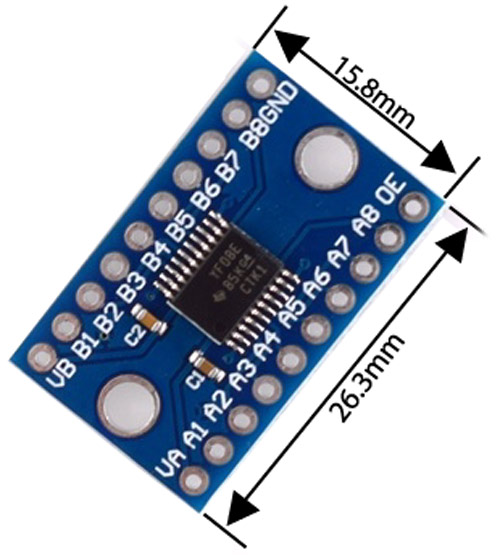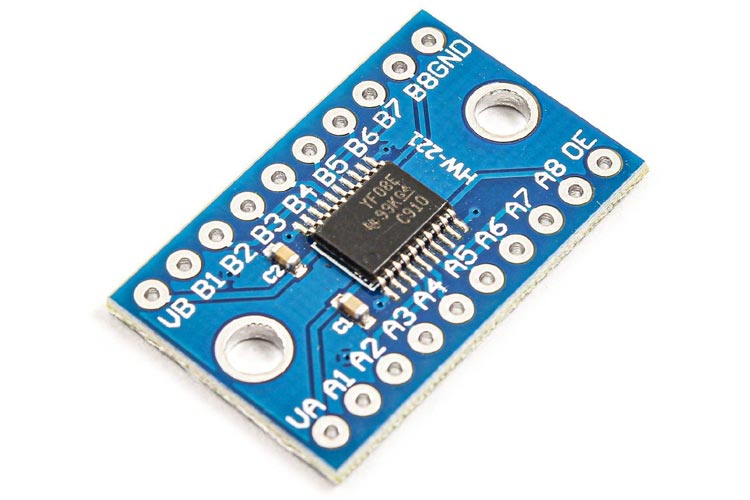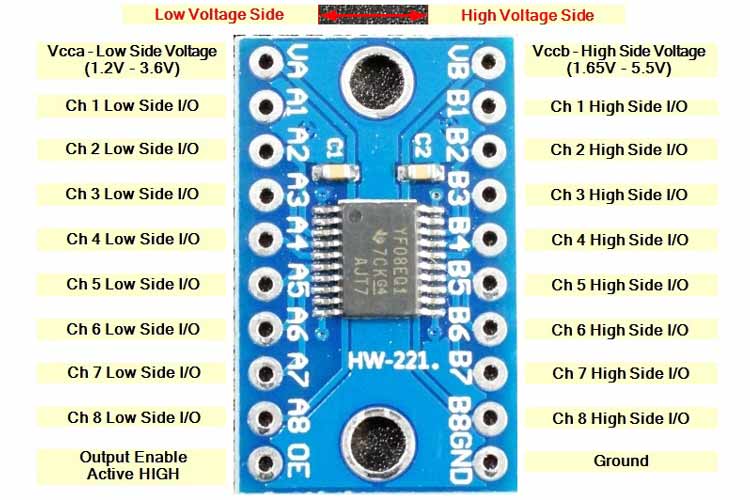TXS0108E 8 Channel Bi-Directional Logic Level Converter Module
Description of TXS0108E Bi-Directional Logic Level Converter Module
TXS0108E Bi-Directional Logic Level Converter Module is a Full-duplex 8-bit Bidirectional logic level translator. The level converter has the capability of converting the logic level of 8-pins on the high side to 8-pins on the low side and vice versa. It also has a serial interface compatible with I2C/UART/SPI ports.
Features and Specification of TXS0108E Bi-Directional Logic Level Converter Module
This section mentions some of the features and specifications of the TXS0108E logic level converter:
- 8-bit non-inverting level translator
- Input Voltage supply: VCCA - 1.4-3.6V DC; VCCB - 1.65-5.5V DC
- No power-supply sequencing required; VCCA or VCCB can be ramped first
- No direction-control signal needed
Alternatives of TXS0108E Bi-Directional Logic Level Converter
CD40109, Texas Instruments SN74AUP1T57DCKR, CD4504BE
Note: More technical information can be found in the TXS0108E Datasheet linked at the bottom of this page.
Pin Configuration of TXS0108E Bi-Directional Logic Level Converter Module
The TXS0108E logic level converter is a 20 pin module. It can be better understood by mentioning the pins as left side and right side pins. A side(A1, A2,....) can accept a voltage range of 1.4V-3.6V so connect the 3.3V logic devices in this side whereas the B side(B1, B2,...) accepts a voltage range of 1.65-5.5V, so connect your 5V logic device on the right side.
|
Left Side |
Left Side pin Description |
Right Side Pins |
Right Side pin Description |
|
VA(VCCA) |
1.4-3.6V Supply Voltage |
VB(VCCB) |
1.65-5.5V Supply Voltage |
|
A1 |
LV/HV Signal 1 |
B1 |
HV/LV Signal 1 |
|
A2 |
LV/HV Signal 2 |
B2 |
HV/LV Signal 2 |
|
A3 |
LV/HV Signal 3 |
B3 |
HV/LV Signal 3 |
|
A4 |
LV/HV Signal 4 |
B4 |
HV/LV Signal 4 |
|
A5 |
LV/HV Signal 5 |
B5 |
HV/LV Signal 5 |
|
A6 |
LV/HV Signal 6 |
B6 |
HV/LV Signal 6 |
|
A7 |
LV/HV Signal 7 |
B7 |
HV/LV Signal 7 |
|
A8 |
LV/HV Signal 8 |
B8 |
HV/LV Signal 8 |
|
OE |
Output Enable |
GND |
Ground |
Understanding the TXS0108E Bi-Directional Logic Level Converter Module
The module can be better understood when divided into two parts/sides; Left side and Right side. Port A tracks the VCCA pin supply voltage(1.4-3.6V) which means that if you supply a voltage of range 1.4V-3.6V to the VCCA pin the Port A is ready to be used for the 3.3V logic devices. The same goes for the right side or high voltage side in this case, Port B tracks the VCCB pin supply voltage(1.65-5.5V).
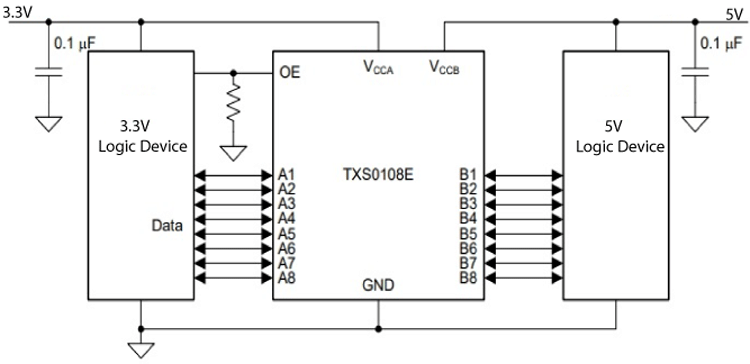
Two input supply pins allow for low Voltage bidirectional translation between any of the 1.2 V, 1.8 V, 2.5 V, 3.3 V, and 5 V voltage nodes.
Basic circuit to understand the proper working of the module
Here is a basic circuit or an example showing an application of the TXS0108E module. Since Raspberry pi works on the 3.3v logic level for it to communicate with an Arduino, which works at a 5V logic, we need a logic level converter.
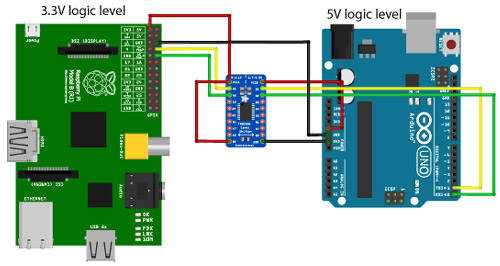
Here in the circuit, raspberry pi is made to communicate with an Arduino Uno board. Since both of the modules operate on different logic levels, a logic level converter is used. The RX TX pin of the RPi is connected to the A1, A2 pins of the level converter which from the other end pins B1, B2 is connected to the Arduinos RX TX pins, respectively. The logic level is shifted from 3.3V to 5V through the module. To power up the module, it is connected to the 5V and the ground pin of the Arduino. As we can observe that VA is connected to the 3.3V pin of the Rpi, which means that the Port A of the module is 3.3V level compatible. Same with the other side, VB is connected to the 5V pin, which makes the Port B 5V level compatible. Both the devices are commonly grounded.
Applications of TXS0108E Bi-Directional Logic Level Converter Module
Here are some of the applications of TXS0108E:
- Used in Smartphones, PC
- Handsets
- Tablets
2D Model and Dimensions
Below is the TXS0108E logic level converter module with its dimensions in millimeters. These dimensions can be used to design custom footprints of the module and be used while designing PCB or CAD modeling.
